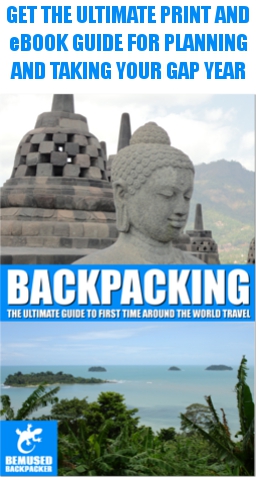
Terror attacks on popular holiday destinations are a rare but unfortunate reality, and they can happen anywhere at any time. As travellers there is always a chance, no matter how low, that we may get caught up in an incident anywhere we happen to be in the world. These simple safety tips should be your guide to keeping yourself safe if you are ever unfortunate enough to be caught up in a terrorist attack.
Paris, Egypt, Turkey, Bali, the list of high profile travel and holiday destinations is a long one, unfortunately the long line of cowards hiding behind religion and twisted ideology is seemingly never ending.
With recent high profile attacks on Paris, Egypt and Turkey hitting the headlines all over the world it is very easy to get caught up in the hysteria and allow paranoid fear to dictate your thoughts and actions. Don’t do that.
It is important to remember that despite the headlines, the chances of becoming a victim are statistically extremely low, and also if you are unfortunate enough to become a victim or get caught up in events where something terrible has happened, a clear head, some preparation and knowledge and a strong plan of action will be your best form of defence.
Extremist activity should never affect what we do.
Before You Go.
Being prepared before you go is essential. The more ready you are for whatever may happen, the safer you will be.
- Consider a gap year safety course or consultation. Like any form of training or schooling, these are all designed to prepare you for any given situation, and can make you much more aware of how to spot potential danger, avoid it if possible, deescalate it if necessary and survive it if all else fails. The Bemused Backpacker Travel Safety Consultation is one, and can help walk you through all those potential worst case scenarios and give you the knowledge you need to survive.
- Do your research. Listening to official advice on what to do is important, but is just a starting point. Remember that many government warnings are overblown at worst or generalised at best, but they are still a good indication of whether you should look deeper into what the situation is on the ground or not. If there are heavy or severe warnings of terror attacks that stop short of stating that ‘all essential travel should be avoided’, then use your common sense. Ask yourself when the last terrorist attack was, is there heightened security in that area due to a recent attack, what specific area is considered unsafe, is it the whole country or just a very small, specific spot? All these questions will help you risk assess if it is safe to travel to an area.
- Leave copies of your itinerary and contact details with friends or family. This isn’t just for their peace of mind, although it certainly does help with that too, this is about giving you extra forms of help if something does happen, and ways for them to try and help if it does. If you can’t contact the embassy or emergency services and they hear of an attack on the news, they may be able to do it for you and give them your details.
- Gather all the essential information you might need and keep a copy with you. Telephone numbers and locations of your country’s embassy, local police stations, hospitals and other emergency services, back up emergency contact details for your friends and family and even local transport or accommodation details are all useful in an emergency.
- Know what to do before it happens. Before you arrive in any new place have a back up plan to evacuate and get out in an emergency.
- Get the right travel insurance. Getting the right travel insurance is absolutely essential for any trip, but ensuring that you get one that covers you for every eventuality is very tricky. As unlikely and as rare as it may be to become a victim, terrorism is very real, and you need to be covered for it. Terrorism and acts of war are often excluded in the majority of basic policies, as this is an easy, blanket way for insurers to get themselves out of paying if anything truly terrible happens. This more often than not means they will refuse to pay out on cancelled flights or planned itinerary changes if a terrorist act or conflict occurs, but more pertinently they will also refuse to cover medical or repatriation expenses if something does happen. There are insurers out there who cover terrorist acts within their policies, you just have to shop around and make sure you read all of the small print before you buy.
Preparing yourself thouroughly should have the effect of reducing any unwarranted fear or paranoia about any given destination. Caution is good, fear is not.
On The Ground.
Odds are when you arrive in a new country and are travelling through it, things will be fine and you will be absolutely safe. There are however ways to decrease the risk factor – no matter how small – of anything bad happening to you.
- Be alert. This really should go without saying. Make yourself become aware of your surroundings, look out for any suspicious activity or objects, and listen to your gut. If something doesn’t feel right, leave.
- Make a plan. If you are with friends, have at least one back up option of where to fall back on and rendezvous if something does happen.
- Take notice of local news. I know when you are travelling the world listening to the news is often the last thing on your mind, but the occasional glance at a headline and chatting to locals can give you infinitely valuable insight.
- Avoid large gatherings and demonstrations. I’m not talking about large festivals or popular tourist spots here, yes they may be targets but they are also the reason many people travel to any given destination. I’m talking about rallies, political demonstrations, large gatherings where tensions may be running high. Generally they are pretty easy to avoid.
- Try and learn a little bit of the language. Knowing a few basic phrases in the local language is a good idea for any trip at the best of times and will add a whole new level to your travel experience, but you should also learn a few phrases such as ‘help me’, or ‘I’m hurt’, and a few essential words such as hospital or ambulance. These few basic things could come in really useful in an emergency.
What To Do If An Attack Happens Near You Or In The Same Country.
Often when attacks happen they are relatively localised to one or two specific areas, and you may find yourself somewhere where an attack has happened but in the next city over or on the other side of the country. You may even be close to the outskirts of the attack itself. The point being terrorist attacks can happen anywhere at any time. You may not be in any immediate danger but the situation will still require action.
- Stay put. If you are already in a safe location, stay there! Do not go out into the street if at all possible.
- Don’t be an idiot. Some people for whatever inexplicable reason think it may be a good idea to head to the location, whether to take photos, start live streaming what is happening or just watch out of morbid curiosity, whatever the reason, don’t be that person. Stay away.
- Get somewhere safe. If you are out in public then head to the nearest safety point as soon as is practical, your hotel, a hotel, an embassy, anywhere practical and close. This is particularly true if you are on the outskirts of any attack.
- Listen to local news and pay attention to local staff. Locals are often the best source of up to date information and it is often a good idea to listen to them. Hotel staff in particular are useful as they will specifically be looking out for their guests.
- Contact family or friends if possible. Letting people know you are okay is important and can be a huge source of relief. Social media is often excellent for this too.
- Contact your embassy. Give them your details and let them know where you are and that you are okay. It may help if someone has contacted them looking for you (if they couldn’t reach you). It also never hurts to let them have that information either.
- Listen to any temporary restrictions. Quite often local police or governments will place temporary restrictions, curfews or no go zones. Listen to them and obey!
What Do You Do If You Are Caught Up In An Attack.
If you find yourself caught up in a bomb blast, a shooting or any other type of terrorist attack then it can be one of the most terrifying experiences of your life, but this is where knowing what to do can really come in useful.
- Don’t be a hero, or an idiot. If an attack happens and you aren’t immediately hurt, then don’t hang around! Don’t try and take pictures or stand and gawk or you’ll get in the way of the emergency services, and unless you are Chuck Norris, Steven Segal or an actual member of the military or emergency services, then don’t try and help either. You’ll get in the way or even worse create extra work for the real heroes who are actually trying to help.
- Try to leave the area as quickly as possible. This should go without saying, but if you are able you should make your way to the nearest safe haven immediately and then move further away when safely possible.
- Obey all instructions. Local police, military or other emergency services will often be on the ground pretty quickly. Listen to everything they say and do it without question.
- Stay away from dangerous areas. You are already in a danger zone, but if you are uninjured and are trying to make your way out of it try – as much as is practical – to stay away from glass windows or any other object where debris and shrapnel can cause you injury if a second blast goes off.
- If you are injured. Contact local emergency services, be aware that local services may be put under extreme pressure in this type of emergency so you will go through triage and be treated on the severity of your injury.
- Remember the silent solution. Not many people know about this but if you need to ring the emergency services and cannot speak for whatever reason, then that doesn’t mean they will automatically come out to you. The UK has a silent solution protocol where if you ring 999 but cannot speak to the operator, then you dial 55 (or SS, hence the name) to help them know this is not an accidental or prank call, and that you need help but can’t speak (if it will give your location away to an attacker for example). Obviously this protocol is for the UK but the principle is the same in any country, when you contact the emergency services just press a touchtone button to silently convey you need help.
It is important to remember that whilst terrorist attacks and other forms of conflict are an unfortunate reality in todays society, on the whole the world is still a very safe place to travel.
The attacks that have happened in recent years, in Paris, Egypt, Turkey, London, Manchester and so, so many other places to numerous to list were horrific, there is no getting around that. They were devastating cowardly attacks by people with an extremely warped and perverted ideology. They do not represent the absolute majority of religions, countries, cultures, races or creeds, so it is nonsensical to judge an entire country or culture unsafe by the cowardly acts of an extremist minority.
Despite what the overblown mass media will have you believe, the chances of being caught up in a terrorist attack are extremely low.
Travel Safe, Travel Smart, But Travel!
It is also important to remember that these attacks can happen anywhere at any time. London and New York have been victims in the recent past. Nowhere is truly safe from terrorism, that is the point. Terrorist attacks can happen just as easily at home as they can on a plane to a tropical paradise. Yet no one declares our home countries as unsafe. No one in the West scurries into a bunker every time the government changes the bulb to a red one in the Foreign Commonwealth Office or GCHQ, yet they are quick enough to declare entire regions as unsafe and cancel travel plans because of a single incident.
Common sense and logic should prevail.
You should still make, or even keep, your plans to travel. Just do your research and be prepared just in case anything does happen. Remember, terrorism wants you to stop travelling. Terrorists want you to live in fear and stay at home. Don’t let them win. Travel safe, travel smart, but travel!
What did you think of this article? Would you cancel or change plans after a terrorist attack? I would love to hear your thoughts in the comments section below or on my Facebook or Twitter pages and please feel free to share it with any or all of the social media buttons. If you want to get more great backpacking tips, advice and inspiration, please subscribe to updates via email in the box to your right.
Related Articles.
Gap Year Safety: The Ultimate Guide For Safely Travelling The World For Sale Now!
If You Stop Travelling, The Terrorists Win.
Missing Air Asia Flight: A Word Of Caution.
Travel Safety Advice. The Good, The Bad And The Downright Crazy.





This is some important and useful advice you give, Michael. My wife and I visited places that have made terror advisory lists but nothing too extreme. Research is probably the most crucial thing, even down to the airport layout and where to find taxis because lots of unsavory characters like to hang around them. I think you take a gamble no matter where you live and the thought that travel is more dangerous than daily life is a bit preposterous to me.
I just relocated to the U.S. and would lie if I told you I wasn’t concerned. Of course, things have been pretty chill and the fears are subsiding. I’ve just been more alert and acted almost like I did when walking through busy Southeast Asian markets. Haha, that’s ridiculous to think that way but it works for me.
Anyway, thanks for sharing this. I really enjoyed reading and comparing my own thoughts on the topic of safety. Take care, Michael.
Thanks Duke, I hate the fearmongering that is perpetrated by the mass media. I mean yes there are dangerous and yes there are preparations to make and precautions to take, but that doesn’t have to mean everyone takes it to the extreme and gets overly paranoid about travel. I’m glad you enjoyed the post. 🙂
Great post! So many useful tips, thank you.
Thanks Nancy.
Such an important post, especially with recent events. Thank you for writing it.
Thanks Alice, I hope people find it useful.
Some really useful and well thought out tips and advice there. Great article.
Thanks John.
This was very informative and awesome to read, I feel these subjects to me are hush hush. However I do like your last comment on travel safe travel smart but travel great motto.
Thank you, I know what you mean. I think it is too important a subject to just keep quiet about though.
I definitely agree that while we need to all be careful we need to not let any of this stop us from living our lives.
Absolutely Megan. Well said.
All really good advice. It’s not nice to think about being in that situation and the likelihood is that none of us will ever be, but it doesn’t hurt to think a little bit and plan ahead. Preparation never hurt anybody!
Thanks Maria, I completely agree. Preparation is partly about making sure you are less likely to end up in the situation too. 🙂
Very useful and spot on. I’ve been to some destinations which have been a target in the past. Being aware of the destination is very important but common sense is usually enough to handle most of the situations.
Above all, we need to keep travelling!
Thank you, I completely agree. 🙂
Great tips here. I don’t think I would cancel a trip just because of a terrorist attack, I would still go to Paris for example. One thing you also need to check is that your travel insurance is sometimes void if your gov’t has issued a travel warning. Don’t be afraid! Travel!
Thanks Rob and you are exactly right, that’s why I always say read the fine print on any insurance, and why I rail against hyper sensitive government warnings that may remain on high alert long after any actual threat have gone. There have been so many examples in recent years of various tourism boards around the world petitioning the UK government to change their advice because it was hurting their tourism. Thanks for commenting.
Interesting post and lots of useful tips – thank you!
Thanks Nancy.
Great tips. Although I think people should let a little time pass before heading to certain areas. And just see what happens as well as research.
Thanks Holly, but that completely depends on the destination and the specific incident. Often security is ramped up to such an extent after any attacks that there is no reason to be afraid, but again that depends entirely on your own research and common sense intuition. You have to take each situation on its own merits.
Great advice. I wish the threat of terrorism wouldn’t change our travel pattern. We never buy travel insurance, but after reading this I’m thinking we should.
Thanks Anda, getting travel advice is always a good idea, risk of terrorism or not. I wouldn’t travel without it.
Sound advice – especially the part about keeping yourself well removed from danger zones. I think travellers tend to feel invincible and the lure of taking photos, etc is strong, plus you want to go and see what’s going on. If you are safe. Stay safe. That said, let’s keep travelling!
Thanks Carol I completely agree, that lure should be completely ignored. There is a time and a place for being inquisitive and taking photos, an emergency situation isn’t it. Thanks for the comment
Very practical tips in the event of any emergency. Well done Mike.
Thank you. I hope people find them useful 🙂
Great timing for this post. I hate the thought of people not traveling due to fear of terrorism. You’ve provided some great information. Good job!
Thanks Mia.
Yes! This! I could not have said it better myself and am SO glad someone finally threw some common sense into the whole debate. There is far too much fearmongering!
Exactly. Thanks for the comment. 🙂
Great article Michael. It’s sad to see the influence that terrorism and political events abroad (eg Turkey) are having on the travel industry.
I totally agree.
True words! The mass panic from the public can get so out of hand sometimes, especially when the mass media gets involved.
It definitely does get out of hand, and the fear it can generate can have a lot of long lasting effects.
Terrorists cannot be allowed to win. I agree with this. The only way to not let them win is to not let them stop us from travelling. Travel is fatal to bigotry.
Exactly.
Wow, this is such important information thank you! I mean not even the government advisory website is as good as this. I hope I never have to use this advice but seriously it is so good to think about and have in the back of my mind in the small and rare chance I ever do need it. I am really loving your site Mike, keep up the amazing work!
Thanks so much, that is exactly what the information is here for, for those just in case rare moments. Hopefully no one reading this will ever need it but I hope it can keep a few people safe if they ever do.